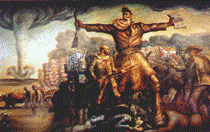History, Department of

James A. Rawley Graduate Conference in the Humanities
Date of this Version
4-7-2007
Document Type
Article
Abstract
History states that the United States defeated Nazi Germany not only militarily, but ideologically too. This assertion is the central concern of my paper. As the liberal, American identity has endured, and German fascism has not, so too has the idea of irreconcilable differences between two opposing political identities. Since 1945, a postwar need to “castigate fascism as an aberration” has certainly given way to more subtle research, that with “an acknowledgement of fascism’s complexity, ambiguity and seductiveness” (Kallis, 1, 2000). However, the “urge to explain … fascism” has endured and is still the central concern of any project, even those which attempt to place fascism in historical context (Kallis, 3, 2003, my italics). This need, in academic circles, for a contrast between past and present society is reflected in every-day life. Americanism has been one such implicit reference for Western European economics and public affairs since 1945, and, as perhaps the feeling of European debt to the United States subsides, even current political attempts at a European identity cannot erase Nazism and the historical advent of American intervention (Judt, 831, 2007). At some point in the future, perhaps, the Soviet Union will be accredited with its somewhat larger human contribution to Germany’s defeat. Over half the total deaths therein, or “25 million persons,” were Russian (Aldcroft, 134, 1980). For now, however, American narratives of the Second World War are resolute: the American identity of voluntarism and freedom triumphed over the fascist identity of communal discipline, both in Europe and the wider world.
The decisive element in America’s contribution to Allied victory in the European theatre was, of course, its superior industrial capacity and resources (c.f. Tooze, 2006). Certain tactical and strategic advantages also played a role. Japanese effectiveness assumed German continental successes and a victory against the United States, as Japan was of course economically weak (Hart, 712, 1974). In assumptions on American victory it is, however, an element of a far more abstract nature which predominates; the afore-mentioned novelty of American morality, and American identity, in contrast with the identity of its fascist opponents. At the heart of this idea is a persuasive proposition, one which this paper addresses: German and American identities were entirely different from one another in the years before democracy fought, and then triumphed, over fascism.
This idea of American national identity as explicitly contrasting – and conflicting – with the National Socialist German identity is not however historically accurate, at least not for certain German- Americans who lived through “the gathering storm” of the latter 1930s. Indeed, the letters of a few Americans, these German-Americans, make a very different contribution to the history of pre-Second World War national and regional identity and perhaps shed light on the later conflict between German and American lives, states and political identities.


Comments
Paper delivered at the 2nd Annual James A. Rawley Graduate Conference in the Humanities, Lincoln, NE. April 7, 2007. Copyright © 2007 Edward S. Price.